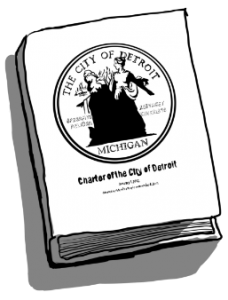For many years the Detroit Public Schools (now Detroit Public Schools Community District) Social Studies departments wrote a book guiding students through the structure of Detroit’s government and “community civics.” The book, and corresponding civics course, was taught in Detroit schools as early as 1938 and, to our knowledge, the final class occurred in the late 1970’s. There were at least eight editions of this book and now, Citizen Detroit and the Detroit Public Schools Community District is building upon this history with a 21st Century edition.
By using this manual, our hope is that you will understand:
- The role that local government plays in shaping the world around you.
- Your rights and responsibilities as citizens of Detroit.
- How to utilize local government to answer your own questions.
And our intent is to inspire you, as Detroit citizens, to be civically engaged in local government as well as to advocate for your interests and the interests of those closest to you.
At CitizenDetroit, we have a philosophy of citizenship that any community member can live by:
-
I work to shape, lead, and give back to my community.
-
I’m informed about my government and encourage others to do the same.
-
I uphold basic democratic principles such as tolerance, civic responsibility, and respect for other voices.
Why focus on local government?
Who is responsible for making a plan for all the abandoned homes and blighted property in our neighborhoods? How about giving licenses to all the new restaurants and businesses that are coming to Detroit? The answer is local government. The individuals who work to ensure Detroiters are afforded basic city services and oversee the improvement of our communities work for local government. Our teachers, police officers, firefighters, bus drivers, and the people who look after our public spaces are all local government workers.
As citizens, there are many concerns we face in our local communities, such as vacant houses, snow removal, power outages, animal control, crime, and other issues. To address these concerns, it’s important we understand our relationship to local government and actively engage in the political process. By being civically engaged, or having active participation, we are able to voice the concerns, needs, and issues facing our communities. These are the rights and responsibilities we hold as citizens of Detroit.
Have you ever seen your parents, family members, or friends come home with a red, white and blue sticker that reads: “I Voted…. Did you?” Maybe you stood in line with them at the polls and experienced the process first-hand. Voting is an important right to exercise, but not everyone exercises that right.
Have you ever voted in a school election?
Voting is the power to decide who speaks up for you, who writes laws, how money is collected and spent, and how initiatives support our lives in Detroit, in Michigan, and across the country. Detroiters not only vote for the President of the United States, we can also elect a mayor, a City Clerk, members of City Council, and school board members, among many other roles. These elected officials create the policies that directly impact members of our community. Understanding the issues and who in local government should be contacted is an important first step in solving problems in our communities. Other ways we can participate in local government include calling, writing letters (or emails), meeting with public officials, attending public meetings, organizing our community around an issue or concern, or running for office ourselves.
The Citizen Manual
Learn about Detroit’s government lesson by lesson or jump to a specific topic!
Get Started

